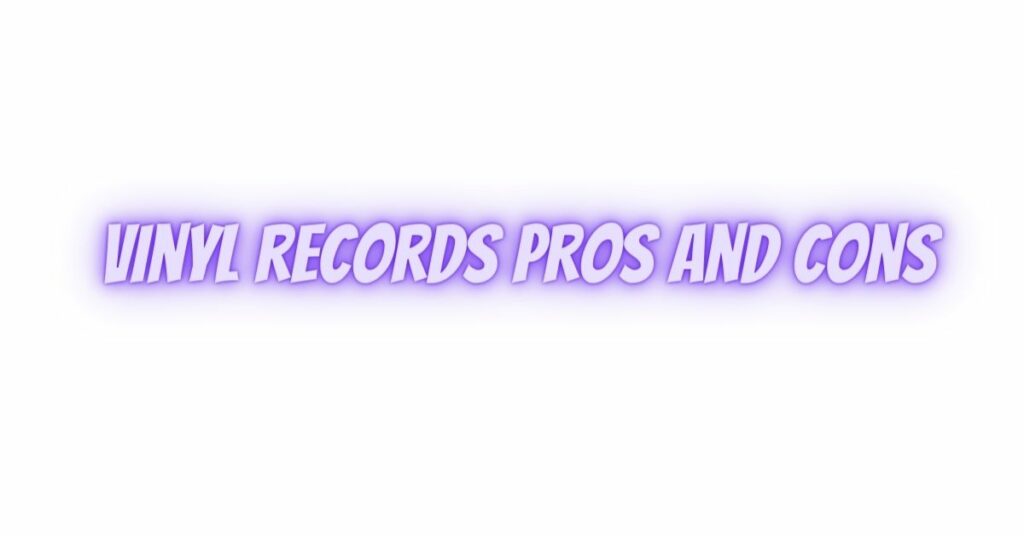Vinyl records, with their rich history and unique analog charm, continue to captivate music enthusiasts and collectors worldwide. While vinyl has made a significant comeback in recent years, it’s essential to consider both the advantages and disadvantages of this medium. In this comprehensive article, we’ll explore the pros and cons of vinyl records, shedding light on why they remain cherished by many and the challenges they present in the digital age.
Pros of Vinyl Records
- Exceptional Sound Quality: Vinyl records are celebrated for their warm and natural sound. Analog audio is captured directly on vinyl, resulting in a depth and authenticity that digital formats often struggle to replicate. Audiophiles appreciate the superior dynamic range and nuances of vinyl, making it an ideal choice for critical listening.
- Tactile Experience: Playing a vinyl record is a tactile and immersive experience. Handling the record, carefully placing the needle, and flipping it over contribute to a more personal connection with the music. The album cover art and liner notes also enhance the visual and tactile aspects of vinyl.
- Collectibility and Rarity: Vinyl records, especially vintage and limited-edition pressings, hold significant collectible value. Collectors seek out rare releases, colored vinyl, and unique editions, creating a vibrant market for vinyl enthusiasts.
- Nostalgia and Sentiment: Vinyl records evoke feelings of nostalgia and sentimentality for many listeners. Owning or playing records from one’s past can transport individuals back to specific moments in their lives, adding a sentimental layer to the listening experience.
- Album Artwork and Packaging: Vinyl records often feature large, visually striking album artwork and detailed packaging. The size of the album cover allows for intricate designs and artwork that can be appreciated alongside the music.
- Resurgence of Vinyl Culture: Vinyl records have experienced a resurgence in popularity, leading to the creation of new pressing plants, record stores, and a thriving vinyl community. This revival has rejuvenated the vinyl culture and introduced the medium to a new generation of music enthusiasts.
Cons of Vinyl Records
- Limited Portability: Vinyl records are relatively large and heavy compared to digital formats. This limits their portability, making it less convenient for on-the-go listening. Portable turntables and record players exist, but they don’t offer the same quality as stationary setups.
- Delicate and Prone to Damage: Vinyl records are delicate and susceptible to damage. Scratches, scuffs, and dust can affect playback quality. Proper handling and maintenance are essential to preserve the integrity of vinyl records.
- Limited Playback Time: Vinyl records have a limited playback time per side due to physical constraints. Albums with longer tracks or extensive content may require multiple discs, leading to interruptions in the listening experience.
- Cost and Accessibility: High-quality turntables and audio equipment can be expensive, making vinyl less accessible to some. Additionally, new vinyl releases and limited editions can be costly. The availability of certain albums on vinyl may also be limited.
- Background Noise and Hiss: Vinyl records are susceptible to background noise, including surface noise, pops, and hiss. While some listeners appreciate the analog character, others may find these imperfections distracting.
- Inconsistent Sound Quality: The sound quality of vinyl records can vary depending on factors like mastering, pressing quality, and vinyl material. Inconsistencies in sound quality may disappoint some listeners.
Conclusion
Vinyl records offer a unique and immersive listening experience that continues to resonate with music enthusiasts and collectors. Their exceptional sound quality, tactile appeal, and collectibility contribute to their enduring popularity. However, vinyl records also come with limitations, including limited portability, susceptibility to damage, and variations in sound quality.
Ultimately, the choice between vinyl records and digital formats depends on individual preferences, priorities, and the listening experience one seeks. For many, the pros of vinyl records, including their exceptional sound and tangible connection to music, far outweigh the cons, leading them to embrace vinyl as a cherished and enduring medium for music enjoyment.


